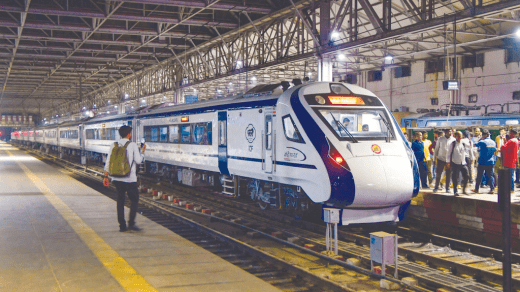Trains have long been an essential mode of transportation for people and goods. With the increasing focus on sustainable development, it has become imperative to understand the fuel efficiency of trains.
Trains are an eco-friendly and efficient mode of transportation, but how fuel-efficient are they? Fuel efficiency is a critical factor to consider while assessing the sustainability of any mode of transportation. In this article, we will take a closer look at the fuel efficiency of trains.
Understanding Fuel Efficiency of Trains
Fuel efficiency of trains is determined by the amount of fuel consumed per unit of distance traveled. A higher fuel efficiency means that the train consumes less fuel to cover the same distance, which can lead to significant savings on fuel expenses in the long run.
Factors Affecting Train Mileage
Several factors can impact the fuel efficiency of trains. Some of the most significant factors are as follows:
Train Design
The design of the train can significantly impact fuel efficiency. Trains with lighter weight and streamlined designs can improve fuel efficiency. Advanced technologies such as regenerative braking can help recover energy lost during braking, leading to improved fuel efficiency.
Operating Speed
The speed at which the train operates can also impact fuel efficiency. High-speed trains consume more fuel than slower trains due to increased wind resistance. However, the use of modern engines and aerodynamic designs can improve fuel efficiency at higher speeds.
Track Conditions
The conditions of the track on which the train operates can also impact fuel efficiency. Uneven track surfaces and excessive curves can lead to increased fuel consumption due to increased rolling resistance.
How to Optimize Train Mileage
To optimize train mileage, it is essential to take the following steps:
Regular Maintenance
Regular maintenance is critical to keep the train in optimal condition. Regular oil changes, cleaning or replacement of air filters, and routine checks of the engine and braking systems can lead to significant improvements in fuel efficiency.
Efficient Train Scheduling
Efficient train scheduling can also help optimize fuel efficiency. The use of advanced scheduling algorithms can help minimize idle time and optimize routes, leading to improved fuel efficiency.
Use of Technology
Technology can also help improve train mileage. The use of regenerative braking systems, lightweight materials, and aerodynamic designs can lead to significant improvements in fuel efficiency.
Train Mileage Comparison with Other Modes of Transportation
When compared to other modes of transportation, trains have some of the best fuel efficiency ratings. However, it is essential to compare the fuel efficiency of trains with other modes of transportation on the same routes and with similar loads.
Fuel efficiency is a critical factor to consider while assessing the sustainability of any mode of transportation. Trains are an eco-friendly and efficient mode of transportation, but their fuel efficiency can be further improved through regular maintenance, efficient train scheduling, and the use of technology.
FAQs
- What is train mileage?
Train mileage refers to the amount of fuel consumed by a train to cover a specific distance.
- How can train mileage be improved?
Train mileage can be improved by regular maintenance, efficient train scheduling, and the use of technology such as regenerative braking systems, lightweight materials, and aerodynamic designs.
- How do train designand track conditions impact train mileage?
Train design can impact train mileage by affecting the weight and aerodynamics of the train. Track conditions can impact train mileage by affecting rolling resistance.
- How does train speed impact train mileage?
Train speed can impact train mileage by affecting wind resistance. High-speed trains consume more fuel than slower trains due to increased wind resistance.
- Are trains more fuel-efficient than other modes of transportation?
Trains have some of the best fuel efficiency ratings when compared to other modes of transportation. However, the fuel efficiency of trains must be compared with other modes of transportation on the same routes and with similar loads.

